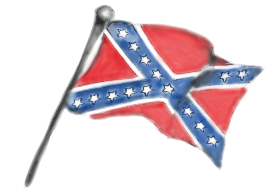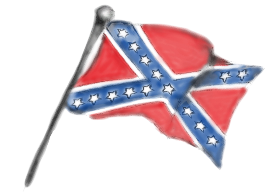by Jim DiFrancesco
Throughout history, symbols have been used to unify and represent groups of people, but over time new groups can adopt these symbols and place their own meaning on them.
The swastika, for example, was originally used in Hinduism and Buddhism to represent the Hindu goddess of wealth and prosperity. However, it later became a symbol of Adolf Hitler and the Nazi Party; associated with hatred, intolerance and genocide.
With the history of the swastika in mind, America must now re-evaluate another symbol, a flag once flown in a rebellion against the United States. One hundred and fifty years ago, 11 states seceded from the United States and formed the Confederate States of America, and a four-year war ensued, with the United States emerging victorious. However, while the swastika is recognized as a symbol of hate, the Confederate flag remains a far more common emblem still used today.
It is legal to display the Confederate flag and swastika in public; however, this is more a question of ethics than legality. For example, when people associate themselves with a Nazi swastika, they generally are part of a group that promotes Nazi ideology or white supremacy. The Confederate flag is often claimed as a symbol of Southern heritage, not treason and racism.
“It describes heritage, but the heritage is built on a foundation of hate,” said sophomore Jalen Bryant, who lived in South Carolina, the first state to secede from the Union, for 14 years.
“More likely than not, if you’re in the South and you openly associate [yourself] with the Confederate flag, [you] still have resentment toward African-Americans and agree with everything slavery stood for. I know this first-hand,” said Bryant.
Bryant isn’t far off. According to the Southern Poverty Law Center’s hate-watch blog, many neo-Confederate groups, such as the League of the South, display the Confederate flag. The flag is also occasionally flown alongside the swastika at neo-Nazi rallies and Ku Klux Klan meetings.
In addition, New Jersey has seen its own fair share of Confederate sentiment. Torri Albrecht of East Windsor was suspended from school in 2011 for wearing a sweatshirt bearing the Confederate flag. And, the infamous “Devil’s Tree” in Bernards Township was also the spot of numerous lynchings during the Ku Klux Klan’s brief yet bloody stay in New Jersey.
The Confederate flag isn’t just a beacon of racism and bigotry, it is a sign of anti-American and anti-government sympathies.
Yet lessening the presence of the Confederate symbol seems far off for Southern states. On Feb. 19, Georgia state officials agreed to release a new vanity license plate featuring a large Confederate flag.
Gov. Nathan Deal said to WXIA-TV in Atlanta, “I don’t think that it is something that we should be that concerned about.” Deal, along with the Georgia legislation, has come under fire recently after the state approved an update to plates that remain available to members of the state’s Sons of Confederate Veterans (SCV). A representative for the group, Ray McBerry, said the plates are meant to honor heritage, not to offend.
The main opposition to the plates is from Rep. Tyrone Brooks, who said in an interview with WXIA, “If the American Nazi Party applied for one of those, would we grant one? Absolutely not.”
Currently, nine other states allow the SCV license plates, while Kentucky and Florida denied the SCV request for plates that display the flag.
Being pro-states rights and wanting a strong state government does not mean that a state wants to secede from the Union and form a Confederacy. However, some regressive views in places like South Carolina and Alabama are a cause for concern as those views seep into the education system.
“We skimmed through the battles that the Confederates lost, and spent weeks on the battles they won,” said Bryant of the way the Civil War is taught at his South Carolina school.
By distorting instruction to this degree, children raised in the school system of South Carolina face having an inaccurate view of what actually happened in the Civil War, and are injected with a large dosage of state pride.
As the United States witnessed in 1861, when states feel they have more rights than the federal government, conflict arises.
The Confederate flag will continue to stir hatred as long as it serves as a symbol of racist and anti-government sentiments.










